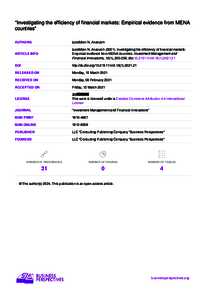Document
Investigating the efficiency of financial markets : empirical evidence from MENA countries.
Identifier
DOI: 10.21511/imfi.18(1).2021.21
Source
Investment Management and Financial Innovations. v. 18, 1, p. 250-259
Country
Ukraine
Publisher
LLC CPC Business Perspectives.
Gregorian
2021-03-15
Language
English
English abstract
The market efficiency hypothesis has become an important concept for all investors looking to own internationally diversified portfolios, which coincides with an increase in investment flows between all countries, both developed and undeveloped. This study was aimed at investigating the efficiency of a group of Arab stock markets located in the Middle East and North Africa (MENA) region according to the Random Walk Hypotheses (RWH) at weak form. The study covered the markets of Jordan, Egypt, Saudi Arabia, UAE, Bahrain, and Oman. The empirical results of all tests used in this study rejected the RWH at a weak form for all markets through all tests applied – Unit root test, Variance Ratio Test, and Run Test. The result of this study contradicts the results of many studies conducted on developed and emerging markets. This can be a good indication of the ineffectiveness of the reforms that have been adopted by responsible bodies on these markets. Based on this result, all efforts made to expand and deepen these markets should be intensified by improving liquidity, transparency, enhancing investment culture in these countries; supporting legislative and regulatory reforms to attract investment, and developing the financial sector in these markets as a whole.
ISSN
1810-4967
Category
Journal articles

